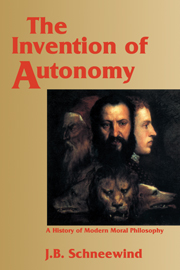Book contents
- Frontmatter
- Contents
- Preface
- Acknowledgments
- A note on references and abbreviations
- Introduction
- Part I The rise and fall of modern natural law
- Part II Perfectionism and rationality
- 9 Origins of modern perfectionism
- 10 Paths to God: I. The Cambridge Platonists
- 11 Paths to God: II. Spinoza and Malebranche
- 12 Leibniz: Counterrevolutionary perfectionism
- Part III Toward a world on its own
- Part IV Autonomy and divine order
- Epilogue
- Bibliography
- Index of names
- Index of subjects
- Index of biblical citations
11 - Paths to God: II. Spinoza and Malebranche
Published online by Cambridge University Press: 05 June 2012
- Frontmatter
- Contents
- Preface
- Acknowledgments
- A note on references and abbreviations
- Introduction
- Part I The rise and fall of modern natural law
- Part II Perfectionism and rationality
- 9 Origins of modern perfectionism
- 10 Paths to God: I. The Cambridge Platonists
- 11 Paths to God: II. Spinoza and Malebranche
- 12 Leibniz: Counterrevolutionary perfectionism
- Part III Toward a world on its own
- Part IV Autonomy and divine order
- Epilogue
- Bibliography
- Index of names
- Index of subjects
- Index of biblical citations
Summary
Herbert of Cherbury and the Cambridge Platonists held that what morality requires, before all else, is the pursuit of perfection; but they had different understandings of the difficulties of the pursuit. Herbert thought that we must increase moral knowledge in order to increase perfection; the Platonists saw insufficient resolution, not ignorance, as the obstacle to virtue. For them we need to strengthen our will so that we can resist temptation and live as we all know we should. Descartes also took the view that the cultivation of strength of will is the path that we must take to achieve virtue. But he presented his view as a second-best morality, an expedient needed because action is unavoidable even though we do not know that we are acting rightly. If we could now pick the fruit of the tree of knowledge, the will, guided by the intellect's clear and distinct perceptions, would necessarily – and without struggle – choose the right course of action.
Descartes could take his morality to be an interim measure because he optimistically thought that research would one day yield enough truth to direct action with certainty. Benedict Spinoza (1632–77) and Nicholas Malebranche (1638–1715) did not share his optimism. Agreeing that perfection is our goal, they held that it would be attainable only if we could know all that God knows, which we plainly cannot.
- Type
- Chapter
- Information
- The Invention of AutonomyA History of Modern Moral Philosophy, pp. 215 - 235Publisher: Cambridge University PressPrint publication year: 1997



